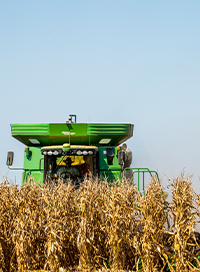 As a farmer, you’re almost always on the clock. Sure, there are some months of the year when work ebbs and flows, but your work never stops. And weed control is one aspect of the work that makes it a year-round job.
As a farmer, you’re almost always on the clock. Sure, there are some months of the year when work ebbs and flows, but your work never stops. And weed control is one aspect of the work that makes it a year-round job.
“I do think weed control is something you need to pay attention to year-round,” says Jeff Moon, Corteva Agriscience market development specialist for Minnesota and Wisconsin. “That way, you can adapt to the evolving needs on your farm.”
Moon has some advice to help you make the most of your weed control program all year long. Let’s look go through his tips season by season.
Fall: Don't Skip the Burndown
Moon advises taking advantage of any good weather you get between now and when the ground freezes to make a fall burndown application.
“Taking action against weeds in the fall can pay big dividends in the spring. That’s because controlling actively growing fall weeds can increase the effectiveness of your spring burndown herbicide program,” he explains.
By controlling any weeds in your fields now, you’re paving the way for a smoother spring and already setting the stage for better yield potential in 2021.
Before applying, you’ll want to check the product label of your herbicide to see if there are any temperature restrictions. Moon says most herbicides cannot be applied once the ground is frozen or in freezing temperatures. He advises making applications when overnight lows are still above freezing and, ideally, staying around 40 F to achieve good performance.
Winter: Plan Your Program Approach
Winter is considered a slower season in the world of agriculture, but that doesn’t mean you have nothing to do. Moon says this is the perfect time to review your weed control program from the previous year, evaluate what worked and didn’t work and then use your learnings to tweak your program approach for the upcoming spring.
He advises you should use the time during the long, cold months to think about the resistant weeds in your area and about the steps you’ll need to take to control them. Be sure to talk with your retailer about the products that will work best for you. The goal is to have what you need and your plan in place so you’re ready to get going at a moment’s notice when the ground thaws again.
Moon says it’s also a good idea to take this time to consider products with flexible application windows, in case spring brings difficult weather delays (as it often does). One place to find the right products to fit your spring schedule is the Corteva Agriscience Corn Herbicides portfolio page.
Spring: Make Herbicide Applications
Once Old Man Winter has melted away, the work really ramps up. Spring is when the new growing season officially begins. Depending on where you live and what the forecast holds, spring applications can get underway as early as February.
Moon says spring is the time to use the program approach you planned out during your downtime. This program should begin with a burndown herbicide application to control any winter annual weeds that are actively growing (hopefully your fall burndown will make this step a little bit easier).
After the burndown, Moon recommends applying a preemergence residual such as SureStart® II herbicide or Resicore® herbicide with multiple modes of action followed by an application of a postemergence with multiple modes of action such as Realm® Q herbicide.
Moon says that incorporating several modes of action into your program will not only help control herbicide-resistant weeds but also help prevent new resistance from developing later down the line.
Summer: Walk Your Fields
Once planting and herbicide applications are complete, there is a bit of a lull in the action during the summer months. Moon says this is when you can get into your fields and scout. He recommends walking your fields once a week or at least every two weeks.
Moon advises looking for issues like disease symptoms, insect damage and, of course, weed escapes. He says you should take good notes about what you find and use that information to inform your plans for the next year.
Field management is a never-ending cycle and one that takes continuous attention and care.
“If you’re doing the same thing now that you did many years ago and you’re not paying attention to what’s going on out there, you’re going to have some trouble controlling weeds,” Moon explains.
He says weeds are always evolving and so are the solutions to control them. By treating weed control as a year-round job, you can continue to evolve with them.
Realm® Q and SureStart® II are not registered for sale or use in all states. SureStart II is not available for sale, distribution or use in Nassau and Suffolk counties in the state of New York. Contact your state pesticide regulatory agency to determine if a product is registered for sale or use in your state. Always read and follow label directions.
The More You Grow
Find expert insights on agronomics, crop protection, farm operations and more.